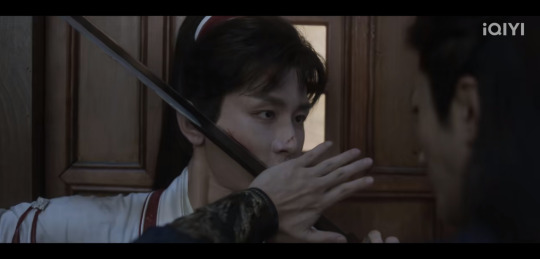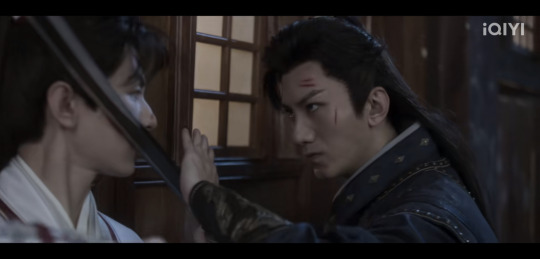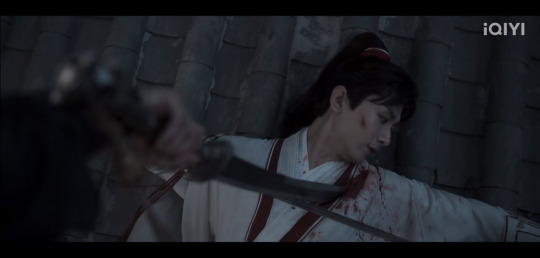#not the direct theme of all this but i maintain that di feisheng is the most 侠义 character in present-day mlc
Text
duel meta
i think a good aspect of the conflict present in the donghai fight is the fact that li xiangyi and di feisheng are each seeing the other as representing incompatible things, and this isn't something that began with the duel but it was part of what doomed them by the end of it.
it has to do with how both of them view their places in the jianghu, in general. li xiangyi by this point has become the symbol of sigumen. he embodies everything it stands for, and by extension of sigumen's prestige, he embodies what those in the jianghu striving for righteousness should look like. he's the legend of both this generation and the next, and when he snaps at shan gudao, li xiangyi literally considers himself the beating heart of sigumen. without him, it can't exist. he has become one with every person he represents while still apart from them, embedded in this fame across the jianghu and all its eyes on him. it's a burden, but while he's placed on the pedestal, li xiangyi still attempts to do good by all who put him on it. so here he stands, trying to shoulder it all.
di feisheng, on the other hand, has always seen his position on an individual level. he's associated with jinyuanmeng and he built it, yes, but that power is not something he's thrown himself into as its leader. he wouldn't say that jinyuanmeng wouldn't exist if he was gone; once di feisheng is reinstated as mengzhu in the present day, the first thing he does is to hand it over to jiao liqiao. his actions throughout the story after that are largely separate from those of jinyuanmeng, and he makes little effort to involve his subordinates except for a few specific people. to di feisheng, his achievements and strength ultimately rest on himself as a swordsman, and his skill compared to other distinguished people at the top of the jianghu. we see that on the night he frees jiao liqiao. he's not here to take over forces or resources, he's just here for one man and the rank he holds.
(i would argue that the power di feisheng did accumulate through jinyuanmeng is for two reasons. one, so that he had enough people behind him to apparently rival li xiangyi, and two, to keep him safe from the di mansion. but that's a different topic.)
so when the war between sigumen and jinyuanmeng breaks out, its final act on the donghai ship is a standoff between two people: one who views himself as representing a collective, and another who considers himself in that moment a swordsman on his own. and this greatly influences how both of them treat that fight.
to li xiangyi, this is a duel contextualized by leadership. because he will take the responsibility for sigumen and his side of the fight, he's focusing all that grief over shan gudao, all that anger and blame on di feisheng alone, as the opposing head of the forces he's been clashing with. since the name of li xiangyi cannot be separated from sigumen (and by now i don't think li xiangyi could define himself as person from image even if he tried), now he attaches di feisheng to jinyuanmeng in his attempt to force him to take accountability. in li xiangyi's eyes, they're really not people in this duel. they're the faces of hundreds more warriors, and every move they make has the lives of those people hanging onto them.
to di feisheng, the fact that they stand alone on that ship means they are alone, cut loose from everyone and everything else in an isolated space. this is a fight in its purest form now. just two men and their blades, relying on their own physical/spiritual strength and nothing else. it's what di feisheng has been waiting for, this chance to challenge li xiangyi where both of them stand on truly equal ground. there is no sigumen or jinyuanmeng dragging them down. they've cut through all the noise of the jianghu that he doesn't care for, and they're just di feisheng and li xiangyi, two highly skilled people who get to see who's stronger in an environment no one else can influence.
(it's worth noting, i think, that di feisheng chose the location of the duel by situating himself and therefore li xiangyi who would find him out at sea, even though the majority of their forces were fighting on land. his men on the ship complained about how horrid a decision it was to be at sea in that weather (it's the first dialogue of the show), but this ensured that any outside/not predetermined interference during their head-to-head would be much more difficult.)
these views or motivations are so terribly at odds with each other. li xiangyi is fighting out of desperate rage and the need for retribution, weighed down more than ever by all the people who look up to him and depend on him to seek justice. di feisheng is fighting for fairly-won status and glory, and in his eyes, for the first time they have been granted the freedom to go against one another where nothing else needs to matter.
it shows in the moves both of them choose to make. namely, that di feisheng fights with more restraint, while li xiangyi fights quite viciously. i'm going to focus a bit more on di feisheng's role here, because i think this contrast on his part is interesting and works to subvert his initial reputation/image, something significant to his character throughout the show (or at least more than it is for li xiangyi).
i would argue that di feisheng is on the defensive for the majority of this fight, as his side has been this entire war. in the duel choreography he's blocking, dodging, or backing up a significant amount more than li xiangyi, who keeps pressing, launching new offenses wherever possible to search for an answer and revenge. there's a clear give and take between them as the fight progresses. and thanks to how this dynamic plays out, and with the background of these characters' motivations, there are three key pauses in the duel that stand out to me. they're all points where di feisheng could have moved on or killed li xiangyi, even as he was the one being attacked, but chose not to.
the first is when li xiangyi is pressed up against the ship wall, di feisheng's sword against li xiangyi's cheek, enough to cut but not enough to lethally wound. they're locked in this position for a good few seconds before either of them react. di feisheng could press forward and cleave his skull, since li xiangyi can't parry him. i couldn't get a good screenshot, but shaoshi is buried in di feisheng's shoulder here. for that di feisheng could also back up and away, given his injury. but he does neither. instead he freezes in place, doing nothing until li xiangyi draws his blade out of di feisheng, and makes the next move.


the second is when there's a lull in the action on the roof of the ship cabin. we get di feisheng's line “一个剑客不该有弱点” ("a swordsman shouldn't have weaknesses") and li xiangyi pausing as the bicha poison begins to take effect. this is another very long break where di feisheng could've taken advantage of li xiangyi being distracted, but he stands still. we learn later that he didn't even know li xiangyi had been poisoned then, so this isn't him dramatically pausing to revel in li xiangyi's pain. his opponent wasn't immersed in the fight, so di feisheng waited until he was. he only moves forward to meet him when li xiangyi chooses to.



these breaks turn the duel into a dance, almost, where di feisheng is letting li xiangyi lead and only moving with him (when they're both in the physical state to). he's fighting with too much respect and leniency to be out for blood the way li xiangyi is, with everyone else on that ship already dead. they're fighting the duel through vastly different lenses and neither of them have realized it yet.
that point of realization is this last pause, di feisheng's blade stabbed into li xiangyi while he stands over him in the rain. the fact that di feisheng isn't actively trying to kill is apparent in two different details here. the first is that di feisheng's blade missed li xiangyi's heart, even though his accuracy as a swordsman is incredible. the second is that, once again, he waits until li xiangyi can move again before attempting to do anything further— except this time he yells that he's won.


this is the moment it genuinely struck for me that their perspectives on this duel are so different. di feisheng dealt li xiangyi a wound that is serious in the moment, but for someone of li xiangyi's strength, he'll be fine in the end. it only takes him out in the short term, and within that time, what di feisheng is waiting for after calling his victory is for li xiangyi to concede the duel. to say it's over, and give over his name as the top swordsman. that's what di feisheng was after.
to him, when it came to li xiangyi, defeating the man and killing him were two different things.
but this isn't where it all stops, because li xiangyi didn't know this (how could he?) and he's fighting for more than ensuring his name remains above anyone else's. di feisheng is fighting cold, but li xiangyi still has so much anger, so much left to do. so much at stake and on his shoulders and 'defeat' and 'giving up' are luxuries he doesn't have.
when the blade in him and the poison taking greater hold pushes li xiangyi into needing a last stand, he refuses to hold anything back. he's an opportunist now, and di feisheng has given him an opening. so out comes wenjing in a surprise attack, there goes di feisheng impaled against the mast, and it all goes to hell. di feisheng can't fight honourably because li xiangyi is coming for his life, and for the first time after a pause like this, he's the one who attacks first.
their last skirmish is because now there's nowhere else for either of them to go. all other motivations have been shattered. either one of them must break, or they must fall together. and the latter is exactly what they do.
perhaps, in a thousand other worlds, the duel went differently. but in this one, li xiangyi fought because he thought they both represented everyone, and di feisheng fought because he believed they represented nothing more than themselves, and neither man could understand that the other didn't share their perspective. signalled though it was throughout the fight, and evenly matched though they were, they were fighting two separate battles on that ship. it wasn't anything they could help, only the result of contrasting lives in the jianghu and what it had shaped them both into. and so there was nothing that could come of that duel except for both of them to lose.
#not the direct theme of all this but i maintain that di feisheng is the most 侠义 character in present-day mlc#and this is where you see the foundations of it#anyways THANK YOU if you actually read all this#i've had these thoughts stewing in my head for days and it all came out tonight#but it doesn't end there. i came up with two other meta ideas in the process of writing this one#here to stay for the long run#also sidenote but i had xiao shunyao's intro rap verse to rock star by MIC on loop in my brain the entire time i was writing this#so i think you should all be proud of me that i got this done#mysterious lotus casebook#feihua#di feisheng#li xiangyi#mlc meta#ashton originals#li lianhua
130 notes
·
View notes